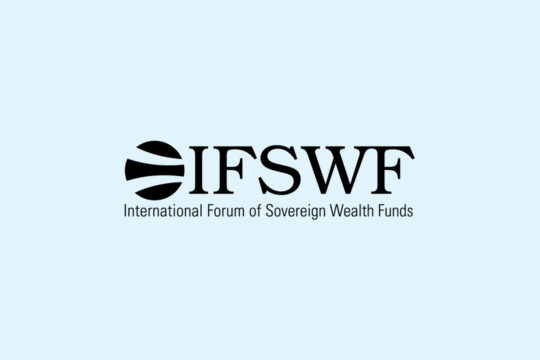


FCLTGlobal’s mission is to focus capital on the long term to support a sustainable and prosperous economy. Millions of people around the world save money every day to meet personal financial goals. The funds to support these goals are safeguarded by institutional investors such as pension funds, sovereign wealth funds, insurers, and asset managers. These savers, their communities, and the institutions that support them make up the global investment value chain, and each benefit from long-term decisions in different ways. Despite overwhelming evidence of the superiority of long-term investments, short-term pressures are hard to avoid.
On 25 June 2024, FCLTGlobal joined the International Forum of Sovereign Wealth Funds’ (IFSWF) Governance Workshop in London to lead a two-part discussion on avoiding short-term pressures and fostering a long-term investment ecosystem centered on meeting their citizens’ needs. The first session focused on advancing these goals by enhancing internal governance structures, and the second session broadened the scope of how funds and their portfolio companies can pursue these goals together.
IFSWF members representing strategic and development sovereign wealth funds from Europe, Africa, the Middle East, and Asia described the specific short-term pressures they face and the tools they need to maintain a long-term orientation.
FCLTGlobal has extensively documented four key sources from which short-term pressure or long-term opportunity can arise – governance, incentives, engagement, and metrics – and workshop discussions reflect the continued importance of these issues.
Governments are the owners of sovereign wealth funds, making a fund’s relationship with its government central to its governance. Participants gave the most attention to how this relationship affects their boards’ composition and priorities.
Participants agreed that having investment professionals on the board contributes to its decision-making having a longer-term focus. However, participants were unanimous in believing that the board should also include key stakeholders, such as government officials, industry experts, and other representatives, in addition to investment professionals.
Further, they believed that having a board only comprised of investment professionals may lead to biases. For example, investment professionals may self-appoint as subject matter experts, thus overreaching in the boardroom and beyond.
“If investment professionals can’t explain their decisions to non-investment professionals, that’s a problem.”
A structural challenge for sovereign wealth funds is that political cycles are commonly shorter than the investment horizons of asset owners. Participants navigate this challenge by understanding the differences between falling into short-term political cycles versus following long-term government policy.
Complementing long-term government policy is integral to the purpose of sovereign wealth funds. Their investment executives understand and embrace this. Participants valued having government representatives on the board, acknowledging that their funds are agents of public savings but also recognizing a need to keep the board’s focus on investing rather than becoming distracted by the short-term pressures of political cycles.
“We try to separate ourselves from politics but align ourselves with policy.”
Long-term asset owner boards, including those of sovereign wealth funds, must strike a balance between governance and management.
Participants agreed that boards of long-term funds should delegate the lion’s share of investment decision-making to executives and staff, including asset manager selection – but within certain thresholds. For instance, boards should retain the decision-making prerogative for allocations or manager selections that could affect the fund’s role, strategy, or strategic risk profile. Specifically, the long-term owner board has a role in approving allocations above ticket-size thresholds for exposure limits and/or concentration limits, as well as for new relationships that the fund expects to be strategic.
Another common theme is succession planning. Participants continually emphasized refreshing the board with directors who have meaningful time remaining in their careers to avoid the risk of seasoned directors retiring around the same time; they also reiterated the importance of other aspects of diversity beyond age, such as gender.
Pay is one of the most important incentives for sovereign wealth funds and long-term asset owners, more generally. Sovereign wealth funds have executives and staff who also feel rewarded by performing public service. Nevertheless, sovereign wealth funds must offer competitive compensation. To do so, they have to determine which talent they are competing for; relevant peers often include other publicly sponsored asset owners or other agencies of government with financial or economic remits.
The emphasis on pay underscores its critical role in attracting and retaining top talent within sovereign wealth funds. Pay is a double-sided coin for public asset owners, who must balance the value of public service with competitive compensation.
During the second session of the workshop, we discussed the relationship between sovereign wealth funds and portfolio companies. Nonetheless, it quickly became apparent that this is a unique relationship for the sovereign wealth fund community.
Sovereign wealth funds do not usually have liabilities, like other asset owners in the pension or insurance industries, and sometimes do not even have to provide regular distributions, like endowments and foundations. Consequently, they can take more concentrated positions with much longer holding periods and engage operationally with portfolio companies in both public and private markets. Indeed, governments sometimes create sovereign wealth funds to steward specific companies and engage with them to improve their long-term performance.
Long-term financial return is a priority metric for strategic sovereign wealth funds but not for stabilization funds or development funds. Strategic investment funds grow national wealth, while stabilization funds protect an economy or currency through down cycles. Stabilization and development funds seek long-term returns consistent with satisfying those goals but do not optimize for it.
“A development fund has to promise commercial returns to foreign investors. It’s less about earning that return themselves.”
Sovereign wealth funds also consider leading indicators of future returns, such as people and operations metrics.
The opportunity – or requirement – to hold concentrated positions for many years makes the relationship between sovereign wealth funds and portfolio companies unique. One participant explained their approach to engaging with companies:
“We have a policy that defines the circumstances in which we expect a portfolio company to proactively engage with us.”
“Sovereign wealth funds know their portfolio companies well, are clear about their investment goals, and have high standards for the relationship. Executives in this session also gave their attention to the question of “who do we put on the board?”
“It’s all about the people when it comes to the governance of portfolio companies.”
Training board members is one way to ensure executives can effectively contribute to these high standards and align with the fund’s objectives.
The discussions at IFSWF’s governance workshop underscored the key components necessary for fostering a long-term investment ecosystem. Institutional investors can help meet the financial goals of savers worldwide by prioritizing strategic governance, designing incentives effectively, focusing on long-term metrics, and engaging actively and purposefully with portfolio companies.
“What we do by being long-term in our approach is freeing companies from other investors’ five-year exit horizon.”
The insights from IFSWF members provide practical steps to counter short-term pressures and promote a culture that values sustainable growth.

Stakeholder Capitalism | Article
28 June 2024 - Despite short-term costs, employee ownership has the potential to create long-term value by improving firm performance and increasing buy-in.

Stakeholder Capitalism | Report
21 March 2023 - A new report, in collaboration with CPP Insights Institute and the ESG Initiative at the Wharton School, explores the role of labour practices in corporate value creation.

Press Release
22 March 2021 - FCLTGlobal’s latest report explores the efficacy of current remuneration plans for corporate executives